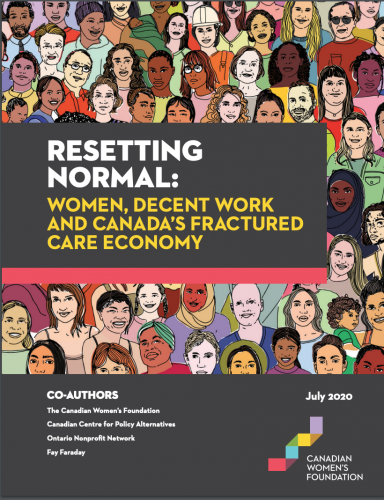Women in Canada have been disproportionately impacted by the COVID-19 pandemic to an extent that threatens to roll back equality gains. Economic losses have fallen heavily on women and most dramatically on women living on low incomes who experience intersecting inequalities based on race, class, disability, education, and migration and immigration status. The pandemic crisis has highlighted the fragility of response systems and the urgent need for structural rethinking and systemic change.
Gender stereotypes position women as natural caregivers with an in-born ability to perform care work, and care work parallels traditional gender roles. In turn, care work is designated as women’s work in the public sphere. Intersecting with gender stereotypes, racist stereotypes and immigration policies serving Canada’s “care deficit” position immigrant, Black, undocumented, and low-income women as best suited to perform care work. It is these women who are at the frontlines of the COVID-19 pandemic.
Care work and other women-majority occupations and industries are essential to containing the pandemic, reducing its impacts, and ensuring that essential services continue to function. These include direct care services such as childcare, long-term care, and gender-based violence services as well as cashiering and cleaning jobs. This is a global phenomenon: in 104 countries, women are at the frontline of pandemic care, comprising 70% of health and social care workers and earning 11% less than men.
The COVID-19 pandemic has spawned national recognition that care work is essential, underpinning our daily lives and the economy. That recognition has brought the fractures in Canada’s care infrastructure—which marginalized women bear the brunt of—to the forefront. As we enter the recovery planning phase, there is an opportunity to leverage this national recognition to gain and sustain decent work for care workers and high-quality care for communities. We can not only forestall loss of equality gains, we can reduce social and economic barriers and advance inclusion, gender equity, and gender equality.
The societal fault lines heightened by the pandemic slice differently through the daily lives of diverse and marginalized communities of women. Resetting normal requires eff ective recovery plans that centre those experiences with eff ective intersectional policy analysis.
Failure to prioritize decent work for women in Canada’s fractured care economy will extend and exacerbate the gendered impact of the pandemic for women doing care work and women who are prevented from rejoining the economy due to lack of access to the care services needed for their economic participation. Women’s economic well-being must be prioritized in recovery plans. A post-pandemic economy and post-pandemic workplaces shaped without women’s participation can only deepen structural barriers to equality.





